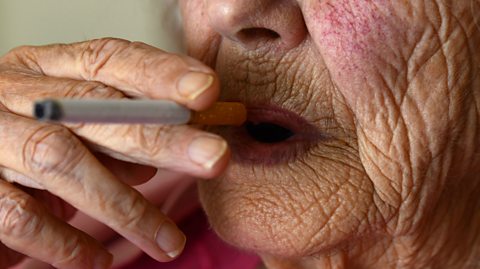How do lifestyle choices impact health?

Poor lifestyle choices such as smoking, drinking excess alcohol or misusing drugs, a poor, ill-balanced diet and lack of exercise impact on health and life expectancy. For example, the links between cigarette smoking and lung cancer or excess alcohol and cirrhosis are well documented.
Studies also show often people in the poorest groups make the worst health choices. For example, smoking and alcohol consumption rates have been consistently higher among the poorest groups for several years.
The stress of living on a low income is one reason to explain poorer lifestyle choices among some poorer people. Cigarettes and alcohol are said to be a distraction from the ongoing problems of life.
How does smoking affect health?
Smoking is one lifestyle choice that can lead to ill health. It can cause issues including heart disease, stroke and a range of cancers, including lung cancer.
In 2021, 24% of adults in the most deprived areas of Scotland were smokers. This is a reduction from 45% in 1999. However, only 5% of people smoked in the least deprived areas by comparison. In 2021, twice as many people aged 45-74 died from cancer in the most deprived areas compared to the least deprived areas. (Source: Scottish Government )
In terms of women smoking while pregnant, 22% of women from the most deprived areas smoked while pregnant in 2021, compared to only 2%, in the least deprived areas.
More recently, the rapid increase in vaping, especially among young people, has been raised as a health concern. Although vapes that contain nicotine only carry a very small short-term risk to health, and much less than smoking, their long term impact is unknown. The Health and Welling Census carried out in 2021-22, a survey of over 25,000 S2 and S4 pupils in Scotland, and found 7.8% of young people regularly vaped in the most deprived areas compared to 4.6% in the least deprived areas.
How does alcohol misuse affect health?
Excessive alcohol consumption can lead to multiple health issues including heart attacks, strokes, and vascular dementia. There is also a strong link between excess alcohol use and mental health problems.
In 2022, Alcohol Focus Scotland (AFS) reported that around 23% of people in Scotland drink more than the recommended maximum level of 14 units per week. Excess drinking was greater for men (31%) than women (16%).
AFS also reported that in 2022 there were 1,276 alcohol-specific deaths in Scotland 2022. This was a 2% increase from 2021 and 25% from 2019.
Finally, research by AFS found that alcohol-related death rates were 4.5 times higher in the most deprived areas compared to the least deprived areas. Alcohol-related hospital stays were 6 times higher among the most deprived areas compared to the least deprived areas.
How does drug misuse affect health?
Drug misuse is another cause of health inequalities, be it reduced life expectancy, poorer morbidity or poorer mental health. In 2022, National Records of Scotland (NRS) found that 1,051 people died in Scotland from drug misuse. This was a decrease of 21% compared to 2021.
As with smoking and alcohol, drug misuse is highest in the most deprived areas. In 2021, Scottish Government information stated 9% of people from the least deprived areas misused drugs compared to 19% in the most deprived areas.
How do diet and exercise affect health?
Eating a balanced diet and taking regular exercise are two key factors for staying in good health and sustaining a health weight. However, too many Scots remain overweight or obese through poor diet and/or a lack of regular exercise.
One study in 2019, found that 65% of adults in the most deprived areas were overweight or obese, compared to 56% in the least deprived areas. 24% of children were at risk of obesity in the most deprived areas compared to only 9% in the least deprived areas.
Other factors affecting health inequalities
Hereditary factors
Recent studies have concluded that there is a link between individuals' health and their family history. Although genes may increase a person's likelihood of developing a certain condition, e.g., coronary heart disease, the risk of this happening is closely linked to other factors such as lifestyles choices and the environment.
Pregnancy and the early years
Research shows that excess stress on a mother-to-be during pregnancy, perhaps due to the impact of poverty or through poorer lifestyles choices, can affect the health chances of the unborn child throughout later life.
In a report from 2021, Public Health Scotland found that mothers from the most deprived areas are more likely to have babies born prematurely and with low birthweight compared to mothers in the least deprived areas.